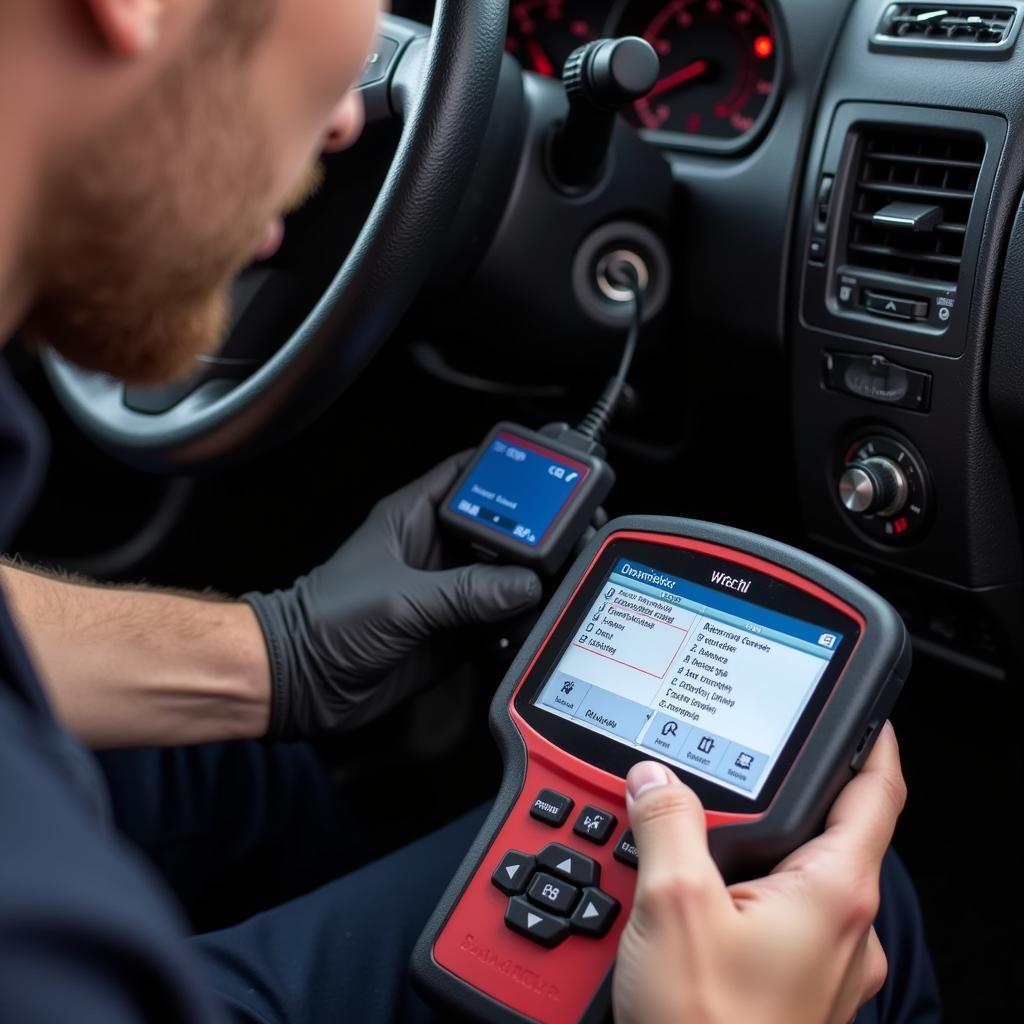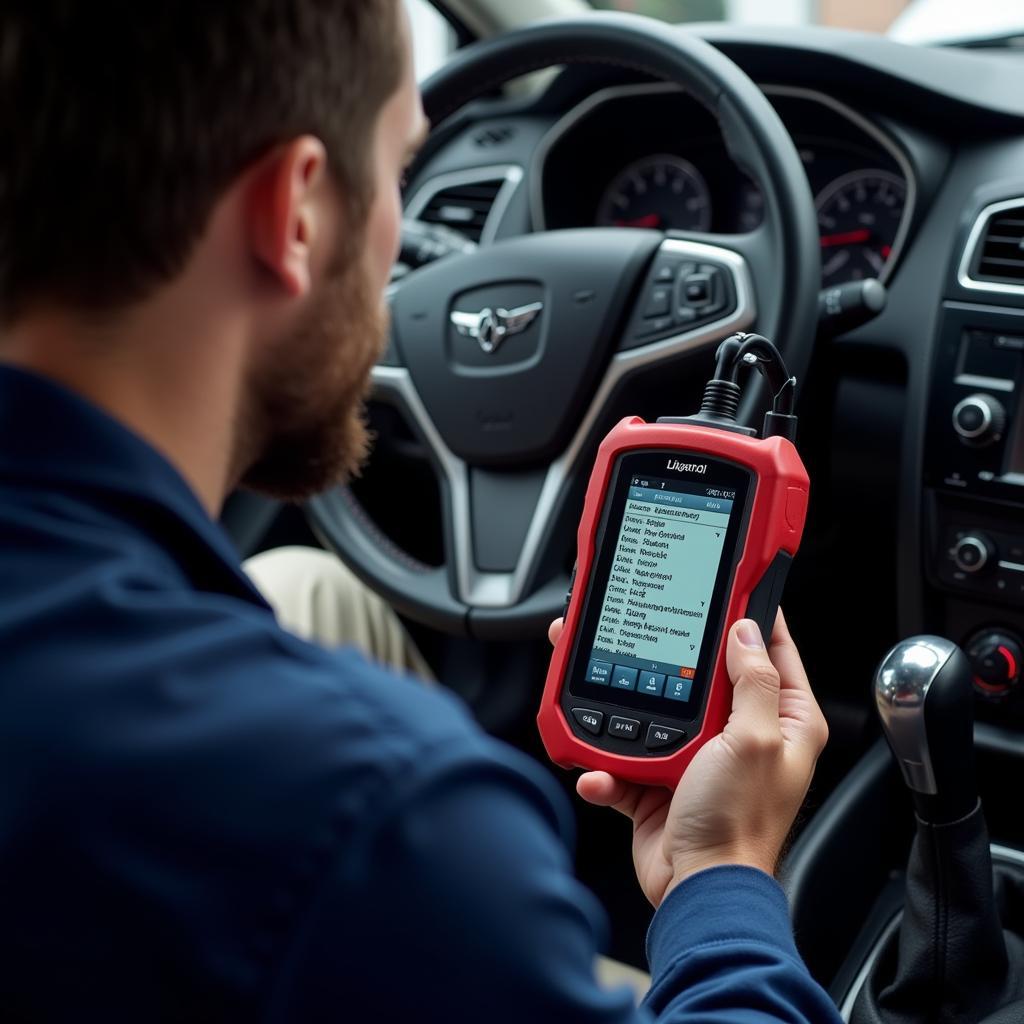A car diagnostic test is a vital procedure for identifying issues within your vehicle’s various systems. By understanding “How Does A Car Diagnostic Test Work,” car owners can gain valuable insights into their vehicle’s health and address potential problems proactively. This article delves into the intricacies of car diagnostic tests, explaining their functionality, benefits, and what to expect during the process.
 Car Diagnostic Equipment
Car Diagnostic Equipment
Understanding the On-Board Diagnostics (OBD) System
At the heart of a car diagnostic test lies the On-Board Diagnostics (OBD) system. This sophisticated computer system, present in most modern vehicles, continuously monitors various components and systems. When the OBD system detects a problem, it generates a Diagnostic Trouble Code (DTC), a unique code that pinpoints the specific area of concern.
The Role of the Car Diagnostic Tool
To access and interpret the DTCs stored within the OBD system, mechanics and technicians rely on specialized car diagnostic tools, also known as OBD scanners. These tools act as a bridge between the vehicle’s computer and the technician, allowing them to retrieve and decode the information.
 Mechanic Analyzing Diagnostic Results
Mechanic Analyzing Diagnostic Results
The Car Diagnostic Test Process
The process of conducting a car diagnostic test typically involves the following steps:
-
Connecting the Diagnostic Tool: The technician connects the car diagnostic tool to the vehicle’s OBD-II port, usually located under the dashboard on the driver’s side.
-
Retrieving DTCs: Once connected, the tool communicates with the OBD system to retrieve the stored DTCs.
-
Interpreting DTCs: Technicians use their expertise and manufacturer databases to interpret the DTCs. Each code corresponds to a specific issue, allowing them to pinpoint the problem area.
-
Further Investigation: While DTCs provide valuable clues, further investigation is often necessary. Technicians may conduct visual inspections, perform manual tests, or consult wiring diagrams to gather additional information.
-
Diagnosis and Repair: Based on the DTCs and further investigation, the technician diagnoses the problem and recommends the necessary repairs.
What a Car Diagnostic Test Can Detect
Car diagnostic tests can identify a wide range of issues, including:
- Engine Problems: Misfires, fuel system issues, emission control problems.
- Transmission Problems: Slipping gears, rough shifting, solenoid malfunctions.
- Brake System Problems: ABS sensor issues, brake fluid leaks, faulty brake components.
- Airbag System Problems: Malfunctioning sensors, deployment issues, wiring problems.
- Emissions System Problems: Catalytic converter issues, oxygen sensor problems, EVAP system leaks.
Benefits of Regular Car Diagnostic Tests
Regular car diagnostic tests offer several benefits, including:
- Early Problem Detection: Identifying issues before they escalate into major problems.
- Preventative Maintenance: Addressing minor issues promptly to prevent costly repairs down the line.
- Improved Fuel Efficiency: Diagnosing and repairing issues that may be affecting fuel economy.
- Enhanced Safety: Ensuring that critical safety systems, such as airbags and brakes, are functioning correctly.
Conclusion
Understanding “how does a car diagnostic test work” empowers car owners to be proactive about their vehicle’s maintenance. By utilizing the power of the OBD system and car diagnostic tools, technicians can accurately diagnose and address problems, ensuring optimal vehicle performance, safety, and longevity. To learn more about the cost of car diagnostic tests, visit our comprehensive guide on how much to do a car diagnostic test.
FAQs
Q: How often should I get a car diagnostic test?
A: It is generally recommended to get a car diagnostic test annually or whenever your vehicle experiences unusual symptoms.
Q: Can I perform a car diagnostic test myself?
A: While affordable OBD scanners are available for personal use, it is generally advisable to have a qualified technician perform the test and interpret the results.
Q: Are car diagnostic tests expensive?
A: The cost of a car diagnostic test can vary depending on the location and complexity of the issue. You can find detailed information about how much is car diagnostic test cost.
Q: Can a car diagnostic test tell me everything that’s wrong with my car?
A: While highly effective, car diagnostic tests may not detect every single issue. They serve as a starting point for diagnosis, and further investigation may be required.
Q: What is the difference between a car diagnostic test and a car inspection?
A: A car diagnostic test focuses specifically on the vehicle’s electronic systems and DTCs, while a car inspection is a more comprehensive visual examination of various components.
For more information on car diagnostics and related topics, you can explore our articles on how long do diagnostics take on a car and what does a diagnostic test show on a car.
Need assistance with your car’s diagnostics? Contact us via WhatsApp: +1(641)206-8880, Email: [email protected]. Our dedicated customer support team is available 24/7 to address your queries and provide expert assistance.

Leave a Reply